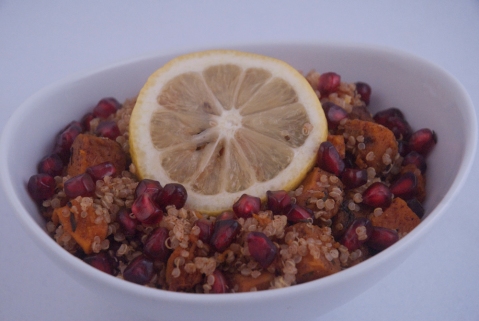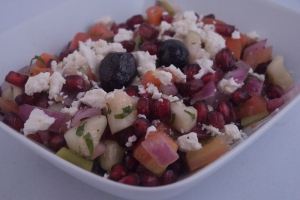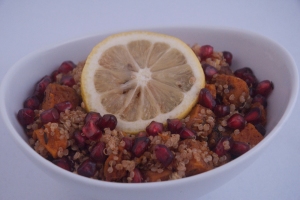The Magic of the Pomegranate
October 25, 2011 § Leave a comment
It is nearly two months since Bus Boy’s departure from NYC and we have fallen into some routines to stay connected. Bus Boy calls me half asleep from Kosovo at 5AM and I call Bus Boy at 11PM New York time when I too am half asleep. These late night/early morning conversations often turn esoteric and philosophical – the reasons for which are not entirely clear to me. During one of these epic conservations we discussed the pomegranate, the topic of my post this week.
According to my research, in some religions and cultures the pomegranate and its many seeds have great symbolism. In Christianity, it is sometimes said that the pomegranate is a symbol of both the church and the resurrection of Jesus – where the seeds represent the Church’s many believers and the seeds bursting from the fruit are likened to Jesus rising from the tomb. In Chinese culture, the pomegranate represents fertility and pictures of the fruit are often hung in homes to bless the dwelling with numerous offspring. Some scholars believe that in the biblical story of Adam and Eve it was a pomegranate that served as the symbol for temptation rather than an apple.
Personally, the pomegranate reminds me of my Sunday morning Hebrew school classes with Dr. Hilfiger. Dr. Hilfiger was a Hasidic Jew and a learned scholar who had a long white beard, round thick glasses, introspective eyes and an inviting smile. He listened to his liberal students and always set out to answer our questions thoughtfully and with consideration to our beliefs – which often diverged from his own. One year he taught a class on the religious significance of numbers in Judaism. Dr Hilfiger taught us that the pomegranate contained 613 seeds which corresponded with the 613 mitzvot or commandments in the Torah. Eating a pomegranate after Dr. Hilfiger’s class was almost a religious experience! With my mother’s help, I would carefully pull the seeds from the flesh, eating them one by one and counting them along the way. My hands would be red for days.
It has been a long time since I have thought about pomegranates. In NYC, without the help of my mother, I have avoided the effort and time needed for extracting the seeds from the fruit. That is until an article in the New York Times entitled, ” After His Brother’s Killing, a Chef Turns to Israeli Food” on Chef Michael Solomonov’s inspiring interpretation of traditional Israeli food reminded me of the sweet, crunchy bite of the pomegranate seed. Forget about the history of the pomegranate and the cultural and religious significance! Figuring out ways to incorporate the seeds into a recipe was a great challenge for the week.
I bought one pomegranate (613 seeds are plenty for an experiment) and brainstormed about how to bring the crunchy bite and the sweet taste of the seed to a fall dish. Inspired by the idea of Israeli food, I added pomegranate seeds to a simple Israeli salad of cucumbers, tomatoes and red onions! The crunch of the seeds added texture to the simple salad and the sweetness of the seeds calmed the acidic dressing. The result was delicious and the pomegranate seed is now a new staple ingredient to my Israeli salad.
I then had an idea for another nutritious salad. Quinoa, my go-to nutritious grain, would be a perfect compliment to pomegranate seeds. While the Israeli salad emphasized the contrast between sweet and sour, I decided to work with a sweeter set of ingredients for this second dish. I combined roasted butternut squash, cinnamon, ginger and pomegranate seeds with the quinoa to make a balanced and sweet (but not too sweet) salad. It was light and full of flavor.
Fortunately, the small red seeds of the pomegranate are nutritious! So nutritious, in fact, Nutritionist Caren explains that they are often referred to as a super fruit. Pomegranate seeds are an excellent source of powerful antioxidants known as polyphenols – more specifically tannins, quercetin and anthocyanins – all of which are believed have anti-cancer and heart health benefits. Their high fiber content (3 grams of fiber for ½ cup of the seeds) and low calories (72 calories for ½ cup of seeds) also make this fruit great for weight management.
Bus Boy loved the ideas for the salads even though there was no way for him to test the recipes himself. Finding a pomegranate in Kosovo was out of the question. He also loved the symbolism of the fruit. As our conversation continued late into the night Bus Boy shared his thoughts on symbols and symbolism in religion and literature. Without skipping a beat, our conversation went from symbolism to signs to fate and ultimately to our “fated” meeting on that hot summer night at the bus stops. I explained to Bus Boy that it is hard for me to believe the saying “everything happens for a reason.” Bus Boy responded that he believes that everything in his life over the past few years led him to “our” bus stop – but he does not minimize the happiness, joy, pain and struggle that it took to get to that night. It amazes me how a conversation about the symbolism of a fruit led Bus Boy and I to discuss the meaning of fate – and yet Bus Boy was still uncertain about what a pomegranate looked like! When I sent him a picture of a pomegranate he let out an audible “ahhh.” Remember, it was 5 o’clock in the morning.
The pomegranate is a distinct looking fruit with a wonderfully distinctive taste. Take some time; find a partner to talk with; and extract seeds from a pomegranate. Try counting the seeds along the way. The creative possibilities and gastronomical delights with the pomegranate are endless!
Israeli Salad with Pomegranate Seeds
Preparation Time: 10 minutes
Total Time: 1 hour and 10 minutes (including allowing the salad to sit at room temperature)
Yield: Serves 4
2 plum tomatoes or 1 large tomato, diced
1 small green bell pepper, diced
1 medium cucumber, diced
fresh parsley, leaves picked but not chopped
½ small red onion, finely diced OR 3 scallions, finely sliced
2 tablespoons fresh lemon juice
2 tablespoons extra-virgin olive oil
salt and pepper to taste
1/2 cup pomegranate seeds
4 oz. feta cheese
1. Toss together all ingredients except for feta cheese in a large bowl.
2. Let sit at room temperature for 1 hour to allow flavors to develop.
3. Toss in the feta cheese just before serving, taste for seasoning and adjust seasoning, if necessary.
Sweet Quinoa Butternut Squash Salad with Pomegranate Seeds
Preparation Time: 5 minutes
Total Time: 25 minutes
Yield: Serves 6
2 cups butternut squash, peeled and cubed into small dice
1 tablespoon olive oil
1 cup uncooked quinoa
1 teaspoon ground cinnamon
1 teaspoon ground ginger
1 1/3 cup vegetable broth
1 teaspoon kosher salt and pepper
1/2 cup pomegranate seeds
6 slices of lemon
1. In a medium saucepan over medium heat, add the butternut squash and oil. Sauté until the squash begins to slightly soften.
2. Add the quinoa and spices to the saucepan. Lightly toast quinoa, stirring constantly, until golden and aromatic, about 1 minute.
3. Add vegetable stock and salt and pepper. Bring to a boil, cover and reduce the heat to low. Cook for 15 minutes or until the squash is soft and the quinoa is fluffy.
4. Toss the pomegranate seeds into the squash and quinoa mixture. Garnish with a lemon. Serve immediately or allow to cool to room temperature.



Leave a comment